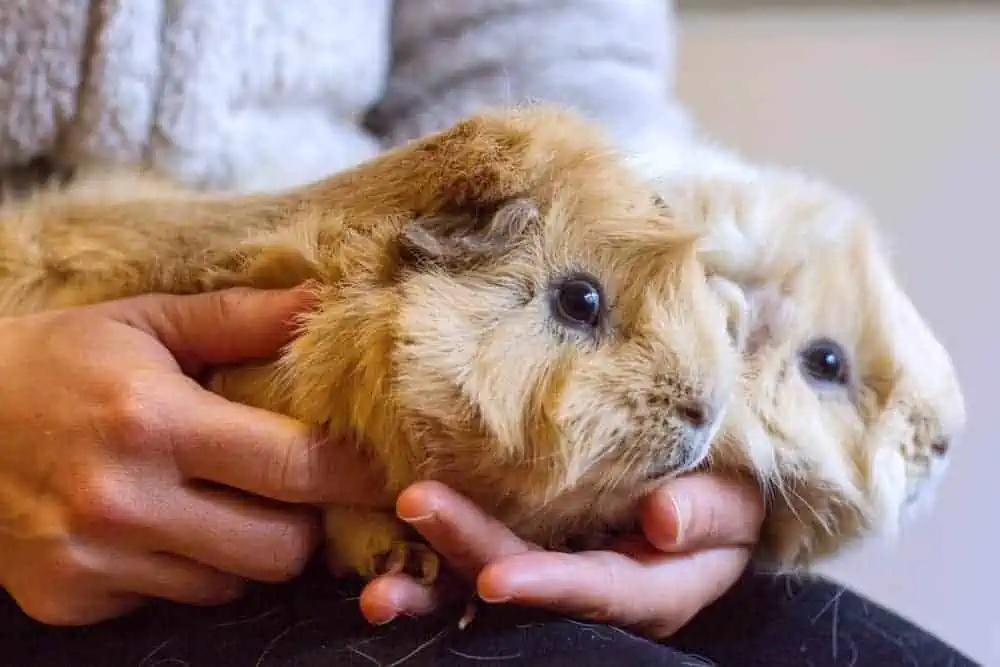
When it comes to protecting our gorgeous small pets from mites, fleas, flies, ticks and mosquitoes – and any other irritating and unwelcome pests – a four-pronged attack is the best approach:
-
Good housekeeping and hygiene
-
Regular health checks
-
Parasite prevention
-
Feeding the right nutrition
1. Good housekeeping and hygiene
- Clean the whole of your pets’ accommodation thoroughly every week using non-toxic cleaning products such as Supreme Keep it Clean. Make sure housing is dry before returning your pets.
- Toilet areas should be cleaned every day and damp and soiled newspaper and bedding hay replaced. Remember to keep back a little of the old hay so that the place still smells like home to your pets.
- Bunnies and guineas may sometimes leave fruit and vegetables uneaten, which will quickly become rotten and mouldy – so check and remove offending items every day.
- Fresh water should be supplied morning and evening. If your pets’ water bottle is turning green with algae, then it is importantly you thoroughly scrub it clean and disinfect it with hot water and vinegar. If you can’t remove the algae then throw the bottle away and buy a new one.
- Groom your pets’ coats regularly to keep them in good condition. Long haired breeds will need grooming daily. Regular grooming will also help you look for any lumps, bumps or bites that suggest your pets are being bothered by parasites so you can deal with it promptly.
Find out how to help your bunnies look and feel their best >>
TOP TIP
Rabbit Welfare advises using small-hole mesh on hutches and runs to keep unwelcome visitors out, fitting insect screens to outdoor enclosures and eliminating standing water – where mosquitoes might breed – from your garden.
2. Regular health checks
It’s really important to give your small pets a weekly health check. As with all healthcare issues, prevention is better than cure – and spotting problems early can make all the difference to your pets enjoying a speedy recovery or becoming very ill.
Burgess in-house vet Dr Suzanne Moyes advises: “As prey animals, guinea pigs and rabbits can be very good at hiding any health issues so that they don’t appear vulnerable. This is why it’s essential that you become familiar with what’s ‘normal’ for them.”
Take a look at our guinea pig health checklist >>
Regular checks can make all the difference to the health and happiness of your beautiful bunnies >>
3. Parasite prevention
- It’s essential to get your rabbits vaccinated regularly. Vaccinations protect them against myxomatosis and Rabbit (Viral) Haemorrhagic Disease (R(V)HD) and R(V)HD2, a new strain of the disease. Your vet will advise how often your rabbits should be vaccinated.
- Only use medicines to treat external or internal parasites (such as mites, ticks and worms) as advised by your vet. Medicines intended for other animals can be very dangerous to rabbits and guinea pigs.
- Check the fur and skin around your pets’ rear ends regularly – daily in warm weather. Urine staining or droppings that are stuck will attract flies, which can cause ‘flystrike’ – a painful, sometimes fatal, condition caused by flies laying eggs that hatch into maggots and eat their host’s flesh. Speak to your vet about specific preventative measures such as Rearguard – a liquid that is applied by sponge and helps prevents flystrike in rabbits for up to 10 weeks, or Fly Strike Protector for guinea pigs.
Please note, that due to coronavirus restrictions, veterinary practices are abiding by set protocols, in line with national guidelines from the British Veterinary Association and the Government. Urgent cases and emergencies will still be treated – but check with your local practice about the procedures they have in place to keep people, as well as animals, safe.
4. Feeding the right nutrition
- Making sure you feed only the best quality food will go a long way keeping your small pets in the best of health and help to keep parasites down. You should feed high quality long-stemmed hay and any fresh food you give your pet should be sweet smelling and dry.
- Following the Excel 5-step Feeding Plan, which was developed in conjunction with one of the world’s leading small-animal vets, will provide your bunnies and guineas with the perfect daily balance of fibre and nutrition.
Find out more about feeding your guinea pigs the correct diet here >>
Find out more about feeding your rabbits here >>
If you found this interesting, you may also like:
HOW TO RABBIT-PROOF YOUR GARDEN Rabbits love to run and roam about your garden, but a determined bunny with digging on their mind can quickly make their escape. Keep them safe with our top tips
MAKING HAY-TIME PLAYTIME Rabbits need to eat their own body size in hay every day to stay healthy. Our in-house vet Dr Suzanne Moyes advises on how to help your bunnies munch their way through their daily ration by making hay-time a fun experience
HAPPY BUNNIES? Find out exactly what your rabbits need to be contented cottontails
CARING FOR YOUR GUINEA PIGS' SENSITIVE SKIN Skin complaints are sadly an all too common issue for pet guinea pigs. Find out what you need to do to keep your piggies comfortable, healthy and itch-free
HAVE YOUR GUINEA PIGS HAD THEIR VITAMINS TODAY? Just like us, guinea pigs need their daily dose of vitamin C to stay healthy. Are your piggies getting the right amount?
OUR 7-POINT GUIDE TO BEING A GOLD-STAR GUINEA PIG OWNER Guinea pigs have been popular pets for generations. Today, we are better informed about how to care for these friendly little creatures, so that we can provide them with everything they need to enjoy happy and fulfilling lives
Sources: rabbitawarenessweek.co.uk, rspca.org.uk, pdsa.org.uk, bluecross.org.uk














